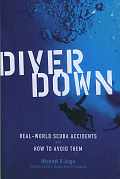 One might consider this book by Michel Ange, who is Technical Editor of Scuba Diving Magazine, a downer as someone dies in almost every chapter. That's because Ange presents a series of case studies of diving gone wrong. Each chapter tackles a specific issue and tells the story on how something went wrong during a scuba dive, often with deadly consequences. The stories are real, though names and places have been changed so as to preserve the privacy of those involved.
One might consider this book by Michel Ange, who is Technical Editor of Scuba Diving Magazine, a downer as someone dies in almost every chapter. That's because Ange presents a series of case studies of diving gone wrong. Each chapter tackles a specific issue and tells the story on how something went wrong during a scuba dive, often with deadly consequences. The stories are real, though names and places have been changed so as to preserve the privacy of those involved.
While Ange's book presents some harrowing evidence that our sport can be dangerous and deadly, we must consider that this applies to almost any sport, and even to life in general. More accidents happen in bathrooms than anywhere else, and no one would consider them especially dangerous or deadly places. The value in Diver Down is that it describes what CAN go wrong if rules are not observed and common sense does not prevail. That is the gist and primary value of this book, to point out what can go wrong if we do not pay attention, become over-confident, or cut corners.
Each chapter is dedicated to a single topic: Nitrox, trimix, over-confidence, lack of experience, cave diving, wreck diving, decompression sickness, dry suits, lack of maintenance, navigation, rebreathers, following rules, and so on. Ange presents a scenario, describes what happenes, often to the bitter end, then analyzes the situation and closes the chapter with a set of rules on how the accident could have been avoided.
What makes the book extra valuable is the technical explanations inserted into each chapter. They explain, in plain English, the underlying concepts, physics, and technology. Likewise, the book's lenghty introduction serves as a Scuba 101 course (and is actually named "Scuba 101"). It is clear and concise and contains a lot of good information.
You will also quickly find that Ange heavily leans on some common sense guidelines: Follow the rules, always. Don't do anything you are not trained to do. Take diving and equipment maintenance very seriously.
Layout and graphics are basic. Do not look for colors and fancy graphics. And if you do not wish to know the outcome of each chapter right upfront, skip the intros that give them away. I have no idea why they are there.
Recommended. In fact, this book is so good, it deserved better graphic layout and treatment. -- C. H. Blickenstorfer






